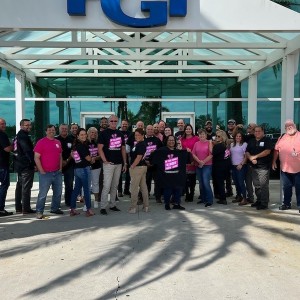When the Great Recession delivered a blow to the housing industry, it forced PGT Industries in Venice to consolidate facilities in Florida and in North Carolina. Thanks in part to economic incentives offered by Sarasota County, the company known for producing storm-resistant glass weathered the economic downturn from Venice, where it brought all its manufacturing operations. The company in the past year announced it’s on the grow again, focused on job creation at locations throughout Florida.It’s perhaps the greatest success story out of an economic development initiative launched more than a decade ago. One that impressed voters enough that they renewed the program in November as the region faces a very different financial downturn, but one that still leaves workers hungry for high-paying jobs in a diverse number of fields besides hospitality and construction.
More than 65.33 percent of voters in Sarasota County approved renewal, and similar city-level referenda were approved by 61.67 percent of the city of Sarasota and 68.2 percent of voters in North Port. The tax exemption means each jurisdiction can grant businesses that are expanding or relocating a property tax incentive of up to 100 percent of taxes owed for up to 10 years. The exemption, which must be approved by commissioners in each jurisdiction, will only be available to companies increasing jobs and paying higher wages than the local median income.
Dave Bullock, president and CEO of the Sarasota County Economic Development Corporation (EDC), said the vote ensures a tool remains in the toolbox for economic development in the community. Since first being approved by voters in 2010, the incentives have been awarded to nine companies. While the businesses receiving the support promised a collective 956 jobs would be created in the region, they have in fact created 1,649 jobs with an annual wage of $46,467.44. The activity primarily took place within the manufacturing sector.
“With the economy like it is now, every company is looking for every advantage they can get,” Bullock said. “Interest rates are low and there is a lot of interest in capital investment. This makes it a little more enticing.” The premise is incentives will prove worth the public investment through lost property taxes because the exemption helps generate high-wage jobs to the benefit of the local economy.
But there’s also value in the exemption in simply getting the attention of scouts and business relocation consultants in the first place. Especially since the state of Florida has largely pulled out of the incentives game, the local incentives help to check a box on the list of attractive qualities of a community to businesses looking to move. “No one comes here just because they get an exemption, but it helps make that decision,” Bullock says. Meanwhile, a community that doesn’t offer an exemption at all may not even make the short list of possible options. “It keeps us in the game and keeps us equal to other communities.” But Bullock stressed that the exemptions also help existing companies looking to grow. One of the largest success stories for the exemption has been PGT, but it’s hardly the only such story.
A total of nine companies received tax exemptions allowed through the Sarasota County program between 2010 and 2019. Only one time, regarding a national roofing company that hoped to move its headquarters here, did county officials deny a request for incentives that had been negotiated by the EDC. But for the companies that did accept the deal, a collective 956 jobs were promised to the region and 1,649 jobs actually arrived. To date, the average wage for those new employees sits at $46,467.44, higher than the $29,969 average income in the county. North Port City Commissioner Jill Luke, who sits on the EDC board, pointed to Tervis, a legendary tumbler company that expanded its global brand significantly in the past decade. Incentives approved by the county encouraged the Venice manufacturer to keep its production facilities in Sarasota County, and the company said it plans to continue to remain in the region in the future even as the methodology for making products evolved.
In fact, as the company reevaluates the use of its north Venice facilities, which may involve downsizing, the fact that local incentives exist mean it could also expand with new buildings in other local jurisdictions. The company is in talks with North Port about opening facilities there and tapping into the city’s incentives, which were renewed the same day as the county. “It’s an important tool in our toolbox,” Luke said.
But is that allowing the private sector to use incentives to pit governments against one another? In this case, Sarasota County officials welcome the chance to keep a manufacturer’s operations in the region. It touches, though, on how competitive governments become in wooing employers.
Indeed, a presentation to Sarasota County Commissioners last year before renewal of the tax was placed on the ballot stressed that neighboring counties will offer incentives to retain or recruit companies even if Sarasota County does not. Both Charlotte and Manatee counties offer similar tax breaks to Sarasota County. So, did extending the exemption keep Sarasota under consideration with any major businesses considering a move here soon? Bullock can’t say for sure, but said the EDC is always in conversations with companies, and it’s probably best the organization didn’t have to announce a sunset of local tax incentives. About five manufacturing and logistics companies continue to engage EDC about a potential move to the region—Bullock cannot disclose names or further details. In total, there’s some 400 new jobs at stake in negotiations.
“Not all these jobs will come about,” he stressed. “You get a lot of tire kickers, just like you may look at a bunch of cars before you settle on one. But we’re confident some of these are going to happen.” SRQ











